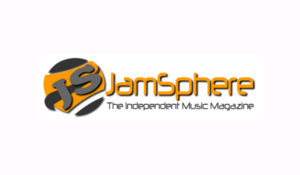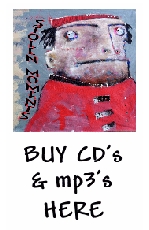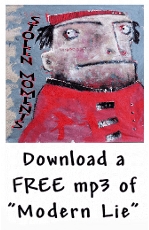
- Where did the songs on your eighth solo album, Stolen Moments come from, have you been storing them away and waiting for the right moment, or did inspiration suddenly hit you?
All my albums are written in the moment prior or during the current recording. Although the track Other One was a lyrical idea kicking around a while. The musical idea of Other One was to wrap Neil Young’s Cortez The Killer around Television’s Marquee Moon guitar atmospherics. The overall song material is written in a stream of consciousness.
- You were joined by Teddy Rixon (bass) and Stevie Carlisle (drums) on your new album, how did that affect the writing and recording process, were you in control the whole time, or was it more of a process where everyone left their mark?
The rhythm section rolls with the songs presented, they play what they’re feeling and we take the song and sounds to where the production is realized. Teddy comes from the Bill Wyman / Ronnie Lane school of bass, and Stevie is a Nick Knox / Mo Tucker guy, and both are perfect for this album. We recorded twenty-two tracks and put together the ten that made the most sense continuity wise. Producing the material myself gives me the freedom to get the tracks just how I imagined them in my head. It’ all about groove, vibes and tones.
- Okay, so we’ve discussed how the album was made, but for someone who is sitting on the fence, why should they grab themselves a copy of Stolen Moments?
There’s no sitting on the fence. If you want some raw, aggressive, real rock-n-roll then jump on board. If you’re looking for the over produced, over thought out and, to these ears, boring, corporate projects, I’m not your guy.
- We always like to ask which artist and bands influenced you to pick up the electric guitar in the first place and who is inspiring you today?
A bunch of artists, but early Stones, which led to the blues masters like Muddy Waters, Slim Harpo, Fred Mc Dowell and the great Magic Sam. Later the sixties and seventies rockers Bowie / Ronson, Iggy and the Stooges, Free , Lou Reed ,and Mitch Ryder. A guy that I’ve been listening to lately is Bo Carter and the Mississippi Sheiks. I always focus on what I would call the “long game” artists like Link Wray, Van Morrison, Iggy Pop and Muddy Waters, people that continue to keep working on their sound. The production sound was an interest also, like the Phil Spector Gold Star recordings, Chess Records, Motown and lots of the indie 60’s garage sounds.
- Was there a definitive moment when you knew you wanted to be a guitarist?
I think it was more of a cumulative addiction, always tone, hooks and guitar riffs, hearing Keith Richards Satisfaction, B.B. King’s Live at the Regal, Peter Green’s English Rose, and the wonderfully distorted Link Wray’s Rumble.
- Do you remember your very first guitar and do you still own it?
My first guitar was purchased from Sears and Roebuck and was an acoustic Silvertone for $25 bucks which led to my first electric Danelectro Longhorn like Link Wray played. Unfortunately, I do not own them today.
- Your first gig: disaster, success, or long forgotten?
I still remember the noise, the beat and crowd. I loved it and thought this is for me. How good the performance was — I don’t remember any negative crowd response, or being hit with anything, and there was a lot of dancing, so it was a success.
- What’s your favorite bit of musical gear in your collection, and what’s the latest addition you’ve made, or are wanting to make?
My 1960’s Framus guitars are favorites, along with my 1961 Supro Ozark. So it comes down to a few to get the colors and character on each song.ffThe Premier Reverberation unit and the Mahoney Cal Tone fuzz pedal are essentials. Two new important additions on this album are a 1971 Framus “Caravelle” and ‘Embargo” pedal designed by Ant Farm Amplification that’s a take on the original Rangemaster. And I’ve been looking for a Hornby Skewes treble booster.
- It may seem like an odd question to ask as you’re still very much in the prime of your career, but what do you look back on as your proudest moment so far?
The work my partner Bruce Cohen and I did working with director Michael Mann, and playing live with the original line-up of The Reds on tour with Blondie, Police, The Ramones, and Joe Jackson.
- To get back to the album Stolen Moments, when you aimed to recreate The Stooges Fun House production style in the studio, was it because you wanted to sound authentic, or were you trying to avoid an ultra-clean modern production sound?
I didn’t aim for the Fun House production, as much as using it for inspiration to my own sound. It came through a bit in the recording process, because generally my production has a heavy lean on distortion and is consistently anything but clean. I think recording live on a Scully 280 gives that early 70’s sound, and on tracks Time Stays and Call My Name we switched to a Ampex 4-track for that early Stones / Pretty Things sound. For me, the tracks All I Want, Modern Lie, Other One, One In Five and Danger Awaits really come the closest to The Stooges Fun House sound.
- In the UK and Europe music magazines and websites they’re incredibly pessimistic. After another year of declining sales of guitar music, everyone seems ready to proclaim the death of rock?
Fuck em, there will always be rockers. What did that old Neil Young say? “Rock and roll can never die.”
- As a great guitarist in your own right, and as a former member of a highly successful act how do you respond when you hear commentators talking that way about guitar-based music?
They’re morons that need something to write about and just show their intelligence, or lack there of.
- Is there an artist whose music you love that might surprise our readers?
Sixties artist Laura Nyro because her lyrics, imagery and intensity is a beautiful thing.
- Is there a guitar or bit of equipment you remember being excited about buying in the moment, but now look back and just shake your head?
That would be a sixties Gibson SG Standard that didn’t have enough bite for me.
- In your eyes, what makes a great guitarist?
Tone, memorable riffs and songwriting. Jimi Hendrix is one of the few artists that had the whole package.
- Time to annoy our guitar obsessed readers: the best guitar in the world is?
The all purpose Fender Stratocaster. God bless Leo Fender.
- What is the best piece of advice regarding the music business that you actually followed so far, and what is the advice you didn’t follow, but now know for sure that you should have?
Play it like you feel it, never give up, block out the noise and write your own material. The worst decision ever was A&M Records insisting The Reds use The William Morris agency to book our live dates. Because it meant firing Ian Copeland, a person we really loved, who was our original booking agent. I felt it was a bad moral and business mistake, but the record label pushed for it because they had their own agenda.
- How would you personally describe your music, in the length of a Tweet, to someone who has never heard your music before?
I don’t tweet, but I am on Facebook (facebook.com/TheRedsMusic).
- Do you consider Internet and all the social media websites, as fundamental to your career, and indie music in general, or do you think it has only produced a mass of mediocre “copy-and-paste” artists, who flood the web, making it difficult for real talent to emerge?
Yes, they’re good tools to reach a larger audience, especially to connect with fans. Real talent will emerge in the long run, though there’s always “short timers.”
- What is the one thing you have never ever been willing, or prepared to do, in your quest to sustain a successful musical career?
Sell out the music for the bucks, or for anybody.
- Rick Jamm, JamSphere Magazine, 2017

